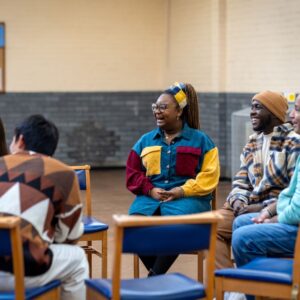Social constraint is the perception that other people don’t want to hear about your life and problems.
It’s the thing that makes you decide not to give a real answer when someone asks how you are doing.
It’s the thing that makes you swallow your own hurt or stifle your own joy even though others are pouring out their hearts to you.
For pastors and other people in ministry who often focus on caring for others at the expense of their own needs, social constraint can lead to isolation and loneliness.
The very real and good boundaries we practice in our ministry roles can warp our awareness of how to meet our own needs for friendship and mutual support.
One solution to the problem of social constraint is joining a peer group where you can be seen and accepted as a complex self — the light and the shadow, the grief and the grace.
Peer groups have the benefit of being free of the unrealistic expectations leaders sometimes feel from the communities they serve. Research has shown that these benefits are increased when people in the peer group come from different ministry contexts, so that competition is removed from the relationships. Remaining a part of a group over time is beneficial, even over great distances, because honest feedback requires deep trust that can only be cultivated over time.
When we’re in peer groups with others, we authorize them to:
- Call us back to our “true” or “best” identity, the image of God that we uniquely carry.
- Encourage us in the practices that care for ourselves — and notice when we don’t.
- Remind us of the call that got us started in our work and the passion we exhibited in the past.
- Warn us when we’re losing our spark for work or exhibiting burnout warning signs.
- Normalize challenges within a field of work.
- Provide perspective and practical interventions on leadership challenges.
The Resilience for Sustainable Leadership Survey responses underscored the positive effects of peer groups. Participating in a small group of peers was correlated with a higher level of satisfaction in all of the domains we assessed: emotional support, rest and renewal, and spiritual life.
Related Resource: Humanizing Pastors – A Focus on Clergy Suicide Prevention
What leaders shared about the importance of peer community:
“Over the last several years, I’ve had a close bond with a few other pastors and we enjoy a great deal of encouragement and spiritual growth together. We are intentional about asking the good questions: how we are relating to those we serve, how we are listening, how we develop folks as the people that the Lord was leading them to be and not carbon copies of us.” Reverend Eric Likkel
“One thing I have heard over and over — from leaders at the end of resilient careers — is that you need to have a strong network of friends who are your inner circle, your ‘holy of holies.’ Resilience is built from the people you have in your life that can speak into your life personally and professionally.” Reverend Jes Kas
Peer groups make us better at ministry by giving us tangible experiences of grace. Generally, peers are kinder to us about our failings than we are to ourselves, and more celebratory of our successes than we can bear. (That’s why we blush.) And in reciprocating those kindnesses — that grace — to others in a peer group, we can learn to internalize that kindness and extend that grace to ourselves.
People do want to hear about your life; they do care about your hurts and your joy — you just have to find your people, and a peer group is a great place to start. Learn more about resilience circles.










0 Comments